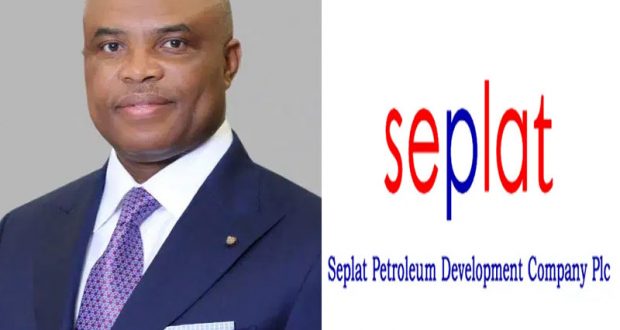………by Jennifer Dike……
……to change to Seplat Energy Plc……..
Seplat Petroleum Plc has now joined the fray to preach for energy transition even as it’s debt profile stands at $440 million (N211.2 billion) and only returned $344 million as dividends after it had raised $535 million from shareholders in form of public offering in the year 2014.
The company’s capital expenditure in the 2020 business year was higher than the $125 million spent in 2019 and has attributed it to the company’s commitment to growth. The company voluntarily repaid $100 million of its Revolving Credit Facility and ended the year with $225 million in cash and net debt of $440 million
According to Seplat it announced in October 2020, an interim dividend of US$0.05 and the Board has further approved an additional top-up of US$0.05, maintaining bringing it’s dividends to US$0.10 for the 2020 financial year.
Seplat Petroleum Development is a Nigerian independent energy company listed on both the Nigerian Exchange Group (NXG) and the London Stock Exchange (LSE) has stated its drive for a sustainable energy generation, even as shareholders gave their approval for a change in corporate name.
The shareholders at the 8th Annual General Meeting (AGM) held jointly physical and virtually on Thursday approved the change of corporate name to Seplat Energy Plc.
The shareholders also approved all resolutions from the Board and commended the performance of the company for the financial year 2020.
In his address to shareholders and other stakeholders during the AGM, Dr. ABC Orjiako, the Chairman of Board, Seplat, said the company’s cash position remained strong in the full-year of 2020 and the $318 million of cash it generated from operations was significantly more than the $150 million invested for future growth.
The company’s average working interest production was 51,183boepd, including 33,714bopd of liquids and 101MMscfd gas (17,469boepd). He said.
“Of this, our Eland assets contributed 8,855bopd, or 26% of total liquid volumes. Our financial performance enabled us to maintain our commitment to paying dividends. While other companies were cutting back or cancelling payments for the 2019 financial year, because of prevailing uncertainties, we honoured our commitment and paid a final dividend of US$0.05, for a total dividend of US$0.10 for 2019.
“The strengthening of our Board is part of our ongoing desire to achieve world-class governance of our company. Six of our 13-member Board are independent and we continue to work towards increasing diversity. In addition, as we announced in March, we have taken the bold decision to eliminate all Related-Party Transactions – a move that exceeds the requirements of the UK Code of Corporate Governance” he added
According to Dr. Orjiako, it is the responsibility of the Board to plan for the long-term sustainability of the company, as scenario analyses on Seplat’s assets have been conducted under different climate change and demand scenarios, whilst looking towards a future in which Seplat is much more involved in promoting low carbon environment in its operations and the company adopting Seplat Energy as its new name following the passage of the resolution at its AGM.
“Such a transition will involve significant new innovations, technology, skills and relationships, compared to our existing expertise of subsurface exploration, drilling and hydrocarbon processing, but we are determined to be a major part of Nigeria’s future energy mix and help drive the country towards more sustainable energy generation,” the Seplat Chairman emphasized.
He added: “Our ANOH Gas Processing Plant will be a major step forwards in Nigeria’s drive to reduce carbon emissions, replacing potentially millions of small-scale, inefficient, and polluting generators with cleaner utility-scale power generation fired by Nigerian natural gas. In addition, we intend to increase our disclosure of environmental, social and governance (ESG) data, by adopting the recommendations of the Task Force on Climate-related Financial Disclosures and will commit to reporting CO2 emission data to the Carbon Disclosure Project in the near future.”
In the same vein, Mr. Roger Brown, Chief Executive Officer, Seplat, said there is pressure to reduce oil extraction and the carbon emissions it creates; but that, he noted, depended on the rest of the world adopting less oil-intensive ways to travel and generate power.
He explained: “Nigeria’s per-capita energy consumption and carbon emissions are actually very low, and its national electricity grid is still very poorly developed. This is why the country is so reliant on small-scale diesel generation to satisfy its energy needs and this is the problem we need to address most urgently.
“It’s important to recognise that Nigeria is a developing country with low access to energy and a rapidly growing young population. Hydrocarbons are the country’s main resource and provide significant help for its economy. The proceeds from the oil industry fund a wide range of Sustainable Development Goals (SDGs) and are crucial to the country’s societal development.
“Nigeria needs to achieve significant growth in its capacity to deliver education and health services, food production and energy security. Without the development of its indigenous oil and gas industry these goals will become very difficult to achieve and so in Nigeria, the industry remains not just relevant but essential.”
 Financial Energy Review
Financial Energy Review





